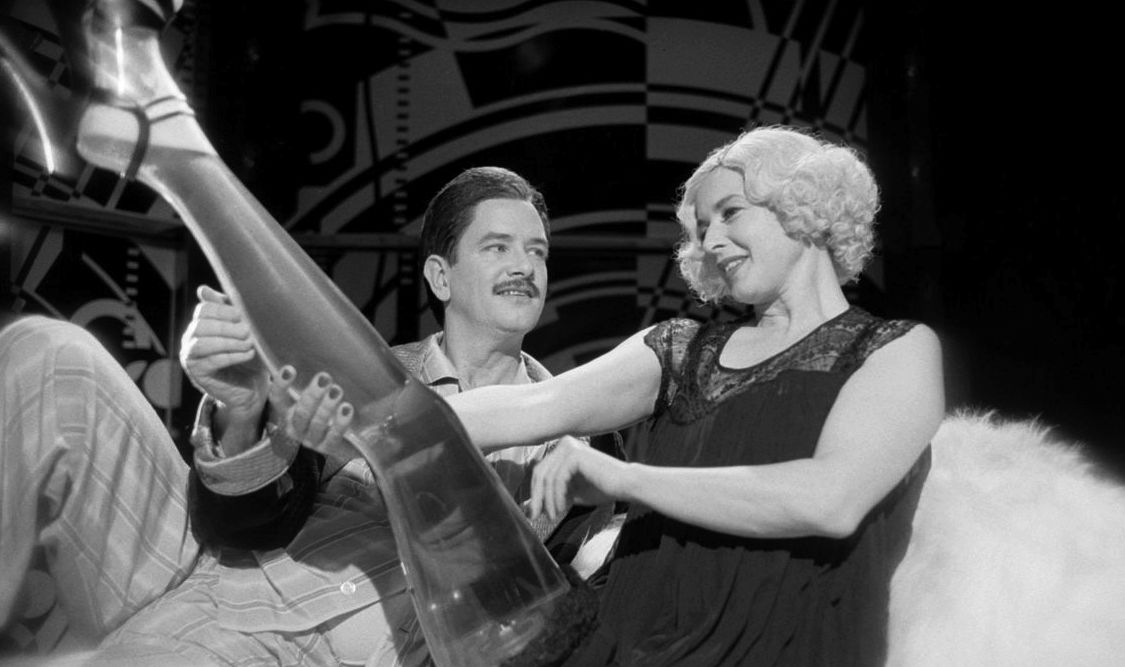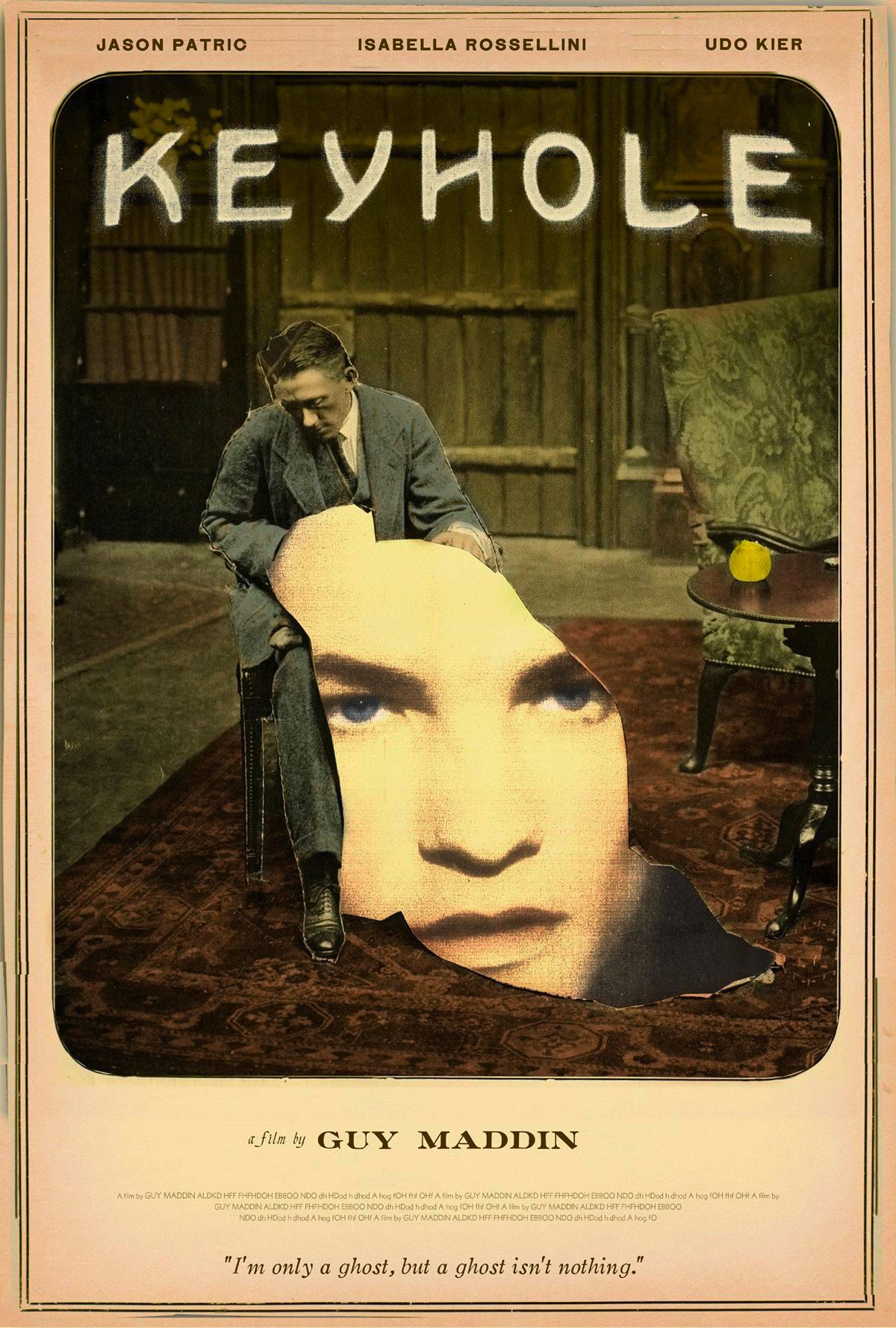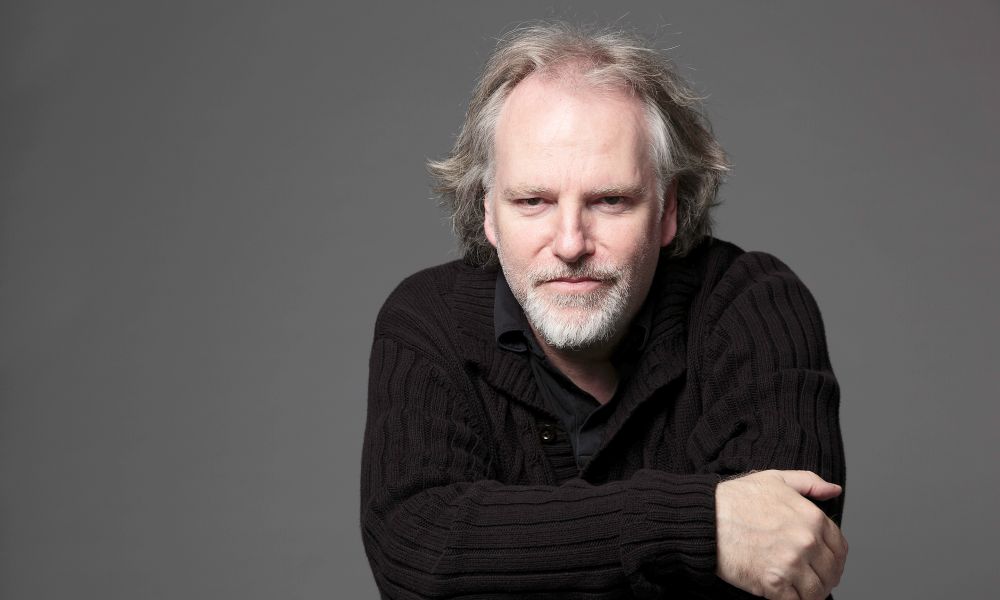"Defiantly and sublimely personal, surreal and amateur, avant garde yet Winnipegian, Guy Maddin is one of most splendidly self-contained artists in world film… His work is known for its evocation of silent, black-and-white cinema, and throughout Maddin there is a wistful feeling for the lost poetry of the late twenties." - David Thomson (The New Biographical Dictionary of Film, 2010)
Guy Maddin
Director / Screenwriter / Cinematographer / Editor / Production Designer
(1956- ) Born February 28, Winnipeg, Manitoba, Canada
(1956- ) Born February 28, Winnipeg, Manitoba, Canada
Key Production Country: Canada
Key Genres: Avant-garde/Experimental, Drama, Short Film, Surrealist Film, Abstract Film, Fantasy, Gothic Film
Key Collaborators: Louis Negin (Leading Character Actor), George Toles (Screenwriter), Jody Shapiro (Producer), John Gurdebeke (Editor), Darcy Fehr (Leading Character Actor), Réjean Labrie (Production Designer), Brent Neale (Character Actor), Victor Cowie (Character Actor), Isabella Rossellini (Leading Actor), Caelum Vatnsdal (Leading Character Actor), Jason Staczek (Composer), Ross McMillan (Character Actor)
Key Genres: Avant-garde/Experimental, Drama, Short Film, Surrealist Film, Abstract Film, Fantasy, Gothic Film
Key Collaborators: Louis Negin (Leading Character Actor), George Toles (Screenwriter), Jody Shapiro (Producer), John Gurdebeke (Editor), Darcy Fehr (Leading Character Actor), Réjean Labrie (Production Designer), Brent Neale (Character Actor), Victor Cowie (Character Actor), Isabella Rossellini (Leading Actor), Caelum Vatnsdal (Leading Character Actor), Jason Staczek (Composer), Ross McMillan (Character Actor)
"Teeming with fever dreams and mortified flesh, luxuriating in an oneiric confusion of amnesia, romantic regret and the ghosts of cinema past, Maddin's films are rapturous and possessed by the faraway spirits of silent and early sound cinema." - Jessica Winter (The Rough Guide to Film, 2007)
"Guy Maddin is a wonderfully contradictory talent. Cultish and described by Claire Monk as 'no-tech', his films are at once quintessentially Canadian and wholly unique, mock-macho fever dreams of lovesick yearning. Even so, they bulge with references to the likes of Sternberg, Fellini, Sirk, Griffith and Eisenstein." - Kevin Harley (Contemporary North American Film Directors, 2002)

The Saddest Music in the World (2003)
"Like his influences Werner Herzog and David Lynch, and peers the Brothers Quay, Maddin works outside the mainstream and has established his own, self-contained cinematic universe that often draws on his own life… Between features, Maddin has directed a great many shorts, some highly wrought and extremely powerful." - Kim Newman (501 Movie Directors, 2007)
“Existing in his own unique crackpot universe is the Canadian fabulist Guy Maddin, whose rousing 2000 short The Heart of the World, about a woman who travels to the earth's core to jump-start it's wavering heart, channeled the frenzied rush of early filmmaking and catapulted the cult hero from Winnipeg, Manitoba to a new level of adulation - reminding cinephiles, with his familiar expressionistic stylings, of the visceral rush that the best movies provide, even in brevity… Enamored with the silent film era, Maddin typically shoots on grainy Super 8 or 16mm film stock, applying various filtering and tinting effects in post-production to create era-approximate screwball comedies that defy comparison but never cease to delight.” - Andrew Bailey (Cinema Now, 2007)
“As well as tributes to movie history, Maddin’s films are also self-portraits, of a bizarrely encrypted sort. He often reworks elements of his life: torrid 2003 melodrama Cowards Bend the Knee is about a hapless hockey player named Guy Maddin (in real life, Maddin’s father was general manager of the local Maroons team). Quasi-documentary My Winnipeg (2007) was a dream-like, hugely unreliable memoir about growing up above his mother’s hair salon. It contains dubious anecdotes about frozen horses’ heads in the nearby river, and arcane sexual rituals at the local department store.” - Jonathan Romney (The Guardian, 2015)
“Over the course of a career that has spanned nearly two decades and 25 films, both short and feature, filmmaker Guy Maddin has provided his viewers with more than their fair share of unique, cinematic moments.” - Jason Woloski (Senses of Cinema, 2003)
“In an age when much of what passes for original is just clever recycling, there’s no mistaking Guy Maddin’s movies for anyone else’s. He draws much of his visual inspiration from the silent era, before the uncharted terrain of moviemaking had been colonized, but his influences are too chaotic to be easily classified.” - Sam Adams (A.V. Club, 2015)
“No one makes films like fabulist Guy Maddin. From his home in Winnipeg, Manitoba, Canada, Maddin is isolated from the facile preoccupations and coarse trends which plague the majority of Hollywood films nowadays. It could be argued, though, that he is also estranged from what passes for independent cinema. Truly a stranger in a strange land. But what a strange land indeed! His films are black comedic excursions into the netherworlds of silent film, but he also has an uncanny feel for replicating images and sounds from painting, classical music, and literature. They could easily become a pretentious mess in less-skilled hands, yet Maddin’s melodramatic films are anything but. They’re playful, complex, hilarious, and exquisite; a perfect melange of high art and camp. Cinematic images that can only be described as post-modern phantasms. Perhaps the only other filmmaker today who is so comfortable reworking such melodramatic terrain is Lars von Trier.” - Derek Hill (Images Journal, 2009)
Selected Filmography
{{row.titlelong}}
GF Greatest Films ranking (★ Top 1000 ● Top 2500)
21C 21st Century ranking (☆ Top 1000)
T TSPDT R Jonathan Rosenbaum
21C 21st Century ranking (☆ Top 1000)
T TSPDT R Jonathan Rosenbaum
Guy Maddin / Favourite Films
Desire Me (1947) George Cukor & Mervyn LeRoy, Female Trouble (1974) John Waters, Hands Across the Table (1935) Mitchell Leisen, Man's Castle (1933) Frank Borzage, A New Leaf (1971) Elaine May, The Other Side of the Wind (2018) Orson Welles, Pinocchio (1940) Ben Sharpsteen & Hamilton Luske, Reap the Wild Wind (1942) Cecil B. DeMille, Wagon Master (1950) John Ford, Wuthering Heights (1954) Luis Buñuel.
Source: Sight & Sound (2022)
Desire Me (1947) George Cukor & Mervyn LeRoy, Female Trouble (1974) John Waters, Hands Across the Table (1935) Mitchell Leisen, Man's Castle (1933) Frank Borzage, A New Leaf (1971) Elaine May, The Other Side of the Wind (2018) Orson Welles, Pinocchio (1940) Ben Sharpsteen & Hamilton Luske, Reap the Wild Wind (1942) Cecil B. DeMille, Wagon Master (1950) John Ford, Wuthering Heights (1954) Luis Buñuel.
Source: Sight & Sound (2022)
Guy Maddin / Fan Club
Jonathan Rosenbaum, Jonathan Romney, Michael Atkinson, Sandi Tan, Mike D'Angelo, David Sterritt, Anton Bitel, John Waters, J. Hoberman, Dennis Lim, John Anderson, Jason Anderson.
Jonathan Rosenbaum, Jonathan Romney, Michael Atkinson, Sandi Tan, Mike D'Angelo, David Sterritt, Anton Bitel, John Waters, J. Hoberman, Dennis Lim, John Anderson, Jason Anderson.
"Fan Club"
These film critics/filmmakers have, on multiple occasions, selected this director’s work within film ballots/lists that they have submitted.
These film critics/filmmakers have, on multiple occasions, selected this director’s work within film ballots/lists that they have submitted.


